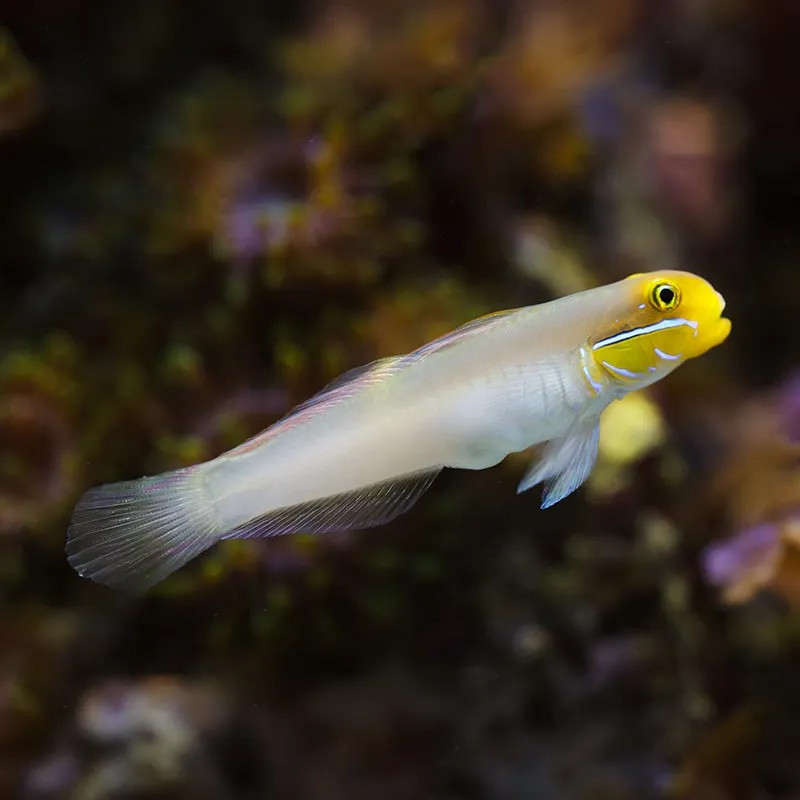Stocks Available
Viva Goby
SKU:215195
Valenciennea longippinis
3.15Inch

Stock Available
Introduction: • Species: Sleeper Gold Head Goby • Common Names: Gold Head Goby, Golden Head Sleeper Goby, Blueband Goby • Natural Habitat: Found in sandy lagoons and coastal reefs of the Indo-Pacific region, especially in shallow waters with plenty of sandy bottoms. Physical Characteristics: • Appearance: Characterized by its striking gold or yellow head that contrasts with its elongated, silver to white body. A distinctive blue line runs horizontally from the eye to the gills. • Size: Typically grows to around 5-6 inches (12-15 cm) in length. • Lifespan: Can live up to 5 years or more in captivity when properly cared for. Habitat Requirements: • Tank Size: Minimum of 30 gallons, but larger tanks (50+ gallons) are recommended for stability and to provide enough substrate for natural behaviors. • Water Conditions: o Temperature: 72-78°F (22-26°C). o pH: 8.1-8.4. o Salinity: 1.020-1.025 specific gravity. • Substrate and Aquascaping: Prefers a fine sand substrate to sift through for food. Provide rocks, caves, or coral rubble for hiding, as well as open areas for burrowing. Diet: • Primary Diet: Carnivorous; in the wild, they feed on tiny invertebrates, such as copepods, worms, and other small crustaceans found in the sand. • Supplemental Feeding: In captivity, they thrive on frozen or live foods like brine shrimp, mysis shrimp, and finely chopped seafood. High-quality sinking pellets are also suitable. • Feeding Frequency: Feed small amounts several times a day, especially if the tank's substrate does not provide enough natural food. Compatibility: • Temperament: Peaceful and non-aggressive. They spend much of their time sifting through the sand and are not territorial. • Suitable Tank Mates: Compatible with other peaceful community fish, such as clownfish, tangs, and small reef fish. • Incompatibilities: Avoid aggressive fish or species that may bully or harass the goby. It may also be outcompeted for food by more active or aggressive feeders. Care Level: • Difficulty: Moderate; requires a mature tank with a well-established sand bed. Stable water parameters and proper feeding are essential for their health. • Health Monitoring: Monitor their condition for signs of malnutrition or stress. Keep an eye on water quality and ensure they are eating well. Breeding: • Breeding in Captivity: Rarely observed in home aquariums. These gobies may dig burrows in the substrate, but successful spawning and rearing are uncommon in typical setups. • Spawning: Pairs may lay eggs in concealed areas like burrows, but parental care is limited. Economic Considerations: • Market Demand: Popular among marine hobbyists for their sand-sifting behavior and bright colors. • Pricing: Moderately priced and widely available in the aquarium trade. Sustainability and Conservation: • Wild Population: Considered stable, though wild collection and habitat degradation can affect local populations. • Aquaculture Efforts: Limited success in breeding in captivity; most individuals sold in the trade are wild-caught. Conclusion: The Sleeper Gold Head Goby is a striking and practical addition to marine aquariums, known for its vibrant appearance and beneficial sand-sifting behavior. While it requires stable conditions and a well-established substrate, this goby can thrive in peaceful community tanks, helping to maintain a clean and healthy environment. With proper care, this species adds both beauty and functionality to any marine setup.
Data sheet
16 other products in the same category: